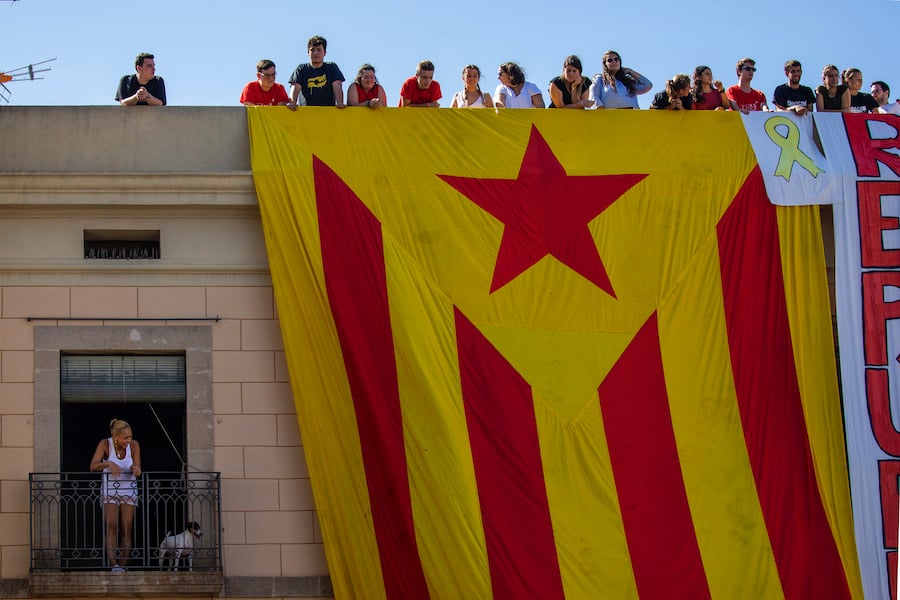(CN) — Galician, Catalan and Basque became official languages in Spain's Parliament on Tuesday, another step in a delicate dance acting Socialist Prime Minister Pedro Sánchez is doing with regional separatist parties to cobble together a new left-wing coalition government.
The recognition of the three minority languages was opposed by the center-right Popular Party, the main opposition, and prompted a walkout of the 33 members belonging to Vox, a far-right party. As they filed out, the Vox members deposited earpieces they were given for translations at the empty seat where Sánchez sits in the Congress of Deputies, the powerful lower chamber of Parliament.
Tuesday's Parliamentary proceedings in Madrid saw regional politicians address Parliament for the first time in their native languages. Translators into Spanish will now become a regular feature, as will large digital screens providing written translations.
José Ramón Besteiro, a Socialist deputy from the Galician city of Lugo, called it an “honor” to be able to speak in his native tongue and added that recognizing the minority languages underscored the “cultural wealth of the country.” Small regional parties have long sought to obtain the right to speak their native languages in Parliament.
The vote for co-official language status passed 176-169 with two abstentions.
Catalan is spoken by about 9 million people in Spain’s northeast and its Balearic Islands. Galician is spoken by about 2 million people in northwestern Spain and Basque has about 1.2 million speakers in the Basque Country and Navarra regions.
Spanish, also known as “castellano” or “Castilian” for its origins in the Kingdom of Castile, is spoken throughout the country of 47 million people, including in places where the other languages are spoken.
Spain's 1978 Constitution recognizes its minority languages as co-official along with Spanish in regions where they are spoken and their use is common in regional parliaments and town halls.
Following inconclusive elections in July, Sánchez, the leader of the center-left Spanish Socialist Workers' Party, needs the backing of the small regional parties to remain in power and avoid new elections.
To woo these parties, his government promised to give Basque, Catalan and Galician official status in Parliament and also to push to make them official languages within European Union institutions. But some EU nations, including Sweden and Finland, oppose that, citing the cost of adding three new languages.
Besides getting official status for the regional languages, Catalonia's regional parties are demanding Sánchez grant amnesty to Catalan politicians and activists who were prosecuted for their involvement in the failed and illegal independence drive in 2017. Granting amnesty would be an explosive issue and possibly violate Spanish law. Before the July elections, Sánchez said he opposed amnesty, but he's shifted his position as he tries to hold onto the premiership.
On Tuesday, Oriol Junqueras, a leader of the left-wing Republican Left of Catalonia, told reporters that during negotiations the Socialists expressed their willingness to grant amnesty.
Junqueras, a former vice president of Catalonia's regional government, was the most high-profile of several Catalan separatists to be sentenced for backing an illegal independence referendum.
The secessionist drive ended in violence after Spanish police were sent to Catalonia to stop the referendum from taking place and to arrest Catalan officials. An amnesty could cover more than 1,400 people who were convicted or sanctioned or face prosecution, according to Òmnium Cultural, a Catalan activist organization.
Junqueras was sentenced to 13 years in prison for sedition and misuse of public funds in 2019, but in June 2021, Sánchez pardoned him and other Catalan leaders.
But an amnesty would have to be extended to the self-exiled leader of the 2017 independence drive, former Catalan President Carles Puigdemont. Puigdemont fled to Belgium following the referendum and he has remained there to avoid prosecution. Puigdemont leads a center-right Catalan party called Together for Catalonia.
Antonio Barroso, an analyst with Teneo, a London-based political risk firm, said in a briefing note that Sánchez and his team are “trying to find a legal formula to accommodate some sort of amnesty that would be palatable for Puigdemont” and remain “in line with the constitution.”
Several heavyweights within the Socialist party, including former Prime Minister Felipe Gonzalez, have come out against an amnesty.
“However, their opinions are unlikely to make much difference,” Barroso said.
“Even if the Socialists offer concessions, the last word will stay with Puigdemont,” the analyst added. “The fact that the hardline secessionist politician remains the main veto player in the negotiation means he might still decide to block any agreement.”
Sánchez is expected to get a chance to form a government in November. The Popular Party, which won the most votes in the July elections, gets a shot at forming a government first, but it lacks the votes to build a majority in Parliament.
Courthouse News reporter Cain Burdeau is based in the European Union.
Subscribe to Closing Arguments
Sign up for new weekly newsletter Closing Arguments to get the latest about ongoing trials, major litigation and hot cases and rulings in courthouses around the U.S. and the world.









